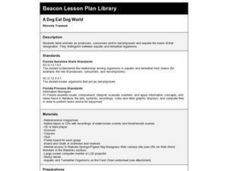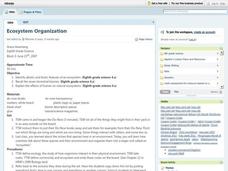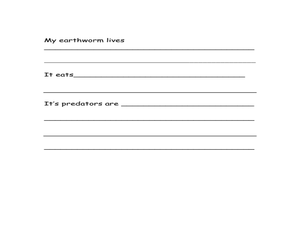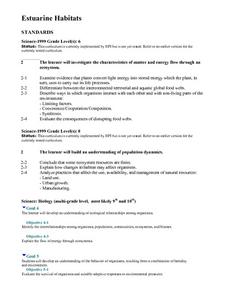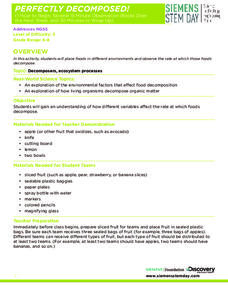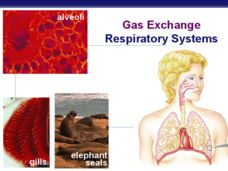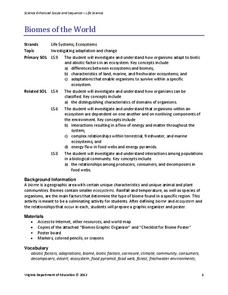Curated OER
Magnetic Field Activities
Learners explore the idea of magnetic field through investigations of magnetic fields as produced by various common magnetic materials and direct currents. They study the vector nature of fields, the ubiquity of field sources in the...
Howard Hughes Medical Institute
Modeling Trophic Cascades
In the ecological game of who eats who, one small change can have a big impact! Individuals create food chains in an array of ecosystems, then determine what happens to organisms in the chain when one organism changes its feeding...
Curated OER
A Dog Eat Dog World
Fourth graders distinguish between acquatic and terrestrial organisms. They label animals as producers, consumers, and/or decomposers.
Curated OER
The Game of Life
Young scholars explore the game of life which refers to what happens to a species when most of the population is gone. In this endangered species activity, students describe what it means for a marine animal to be endangered. Young...
Curated OER
Ecosystem Organization
Eighth graders engage in a lesson about ecosystems with the intention of looking at how it is organized. They cover the biotic and abiotic factors of an ecosystem while looking at the seven types of terrestrial biomes. Students write...
Curated OER
Summer: Getting the Bugs Out
Students study biodiversity while examining insects. They research insects that already exist and how they adapt to their environment.
Curated OER
Earthworms and Making a Wormery
Students explore the environment by researching insects. In this earthworm instructional activity, students utilize soil and plexiglass to build a see through wormery in which students can observe the worms at work. Students identify the...
Curated OER
Estuarine Habitats
Sixth graders study the important habitats, flora, fauna, and physical factors of coastal habitats. They compare the aquatic habitats to terrestrial habitats by researching and completing tables with the information.
Curated OER
Sustaining Life Under the Ice
Pupils design and conduct experiments in order to identify the components of lake water environments that are affected by winter ice cover. They use the experiment results to propose effective human management of these ecosystems.
Discovery Education
Perfectly Decomposed!
We all know someone who won't eat the banana with a brown spot, the grape with a dimple, and the apple with a bruise. Scholars use different fruits to explore what happens when fruits really start to decompose. They set up an experiment...
Curated OER
Designing an Underwater Habitat for Humans
Students consider the limitations of deep water oceanography and design an underwater habitat to support scientists while they complete long term studies under the ocean. For this engineering lesson, students are introduced to the...
Curated OER
Gas exchange: Respiratory Systems
The need for a respiratory system in humans versus being reliant on gas exchange structures is demonstrated. There are many details about the advantages and disadvantages of each mechanism. Students are able to learn about the...
Curated OER
Isopod Behavior, of the Rolly Polly Lab
Young scholars investigate the behavior of isopods. In this isopod lesson plan, students make observations of an isopod and sketch the pillbug. They study the orientation of the isopods in relation to moisture in a chamber they construct...
Curated OER
Questions - Appearances are Deceiving
Five evolution-related questions are answered by beginning biologists on a separate sheet of paper. First, they are asked to list adaptations that allow organisms to survive under various conditions. The second question refers to...
Curated OER
Kidney Structure and Function: removing intracellular waste
Your class will learn all about the function of the kidney and how it operates in animals from different habitats. The methods of absorption, filtering and excretion are detailed and pupils will learn of the different disposal methods...
Curated OER
Visual Vocabulary
Students interpret and name the vocabulary termed acted out by the mime. For this science/language arts/physical education lesson, students are given a set of vocabulary terms to discuss within their group. Next, students place all...
Virginia Department of Education
The Cycles of Nature
Encourage peer collaboration and assist with the creation of visual aids to identify carbon, water, and nitrogen cycles as your class learns more about nature. They discuss relative information, create a visual aid depicting the chosen...
Curated OER
Exploring Microclimates
Students compare the land cover and temperatures in different microclimates to begin to explain why organisms live where they do. While exploring microclimates, students record temperature readings and detailed observations.
Curated OER
Make a Mission
Students discuss the terms exploration and technology. They read about the MESSENGER, Mission to Mercury, and answer questions. Next, they design and plan the technology for a space mission using an online interactive activity.
Virginia Department of Education
Biomes of the World
Incorporate knowledge about biomes and ecosystems in multiple ways while encouraging creativity. Emerging ecologists collaborate and perform research to complete a graphic organizer about various biomes of the world. They conclude the...
Biology Junction
Amphibians
Biologists know of more than 2,300 living species of amphibians. Learn more about the four orders of amphibians with an interesting presentation. It explains the similarities and differences between the thousands of species of...
Curated OER
Diversity of Life
Students study Arthropods and their characteristics. In this organisms lesson students explore the success of Arthropods and answer questions.
Curated OER
What A Tangled Web We Weave
Learners of many ages discuss how all organisms rely on other organisms for their survival. They construct a food web and energy pyramids, and write an informative essay about the food web that they have designed.
Curated OER
Study of Animals
Third graders use the internet to research about an animal. After watching a demonstration, they follow the same steps to gain access to the internet as their teacher and find a picture of their animal to print. They complete a worksheet...




